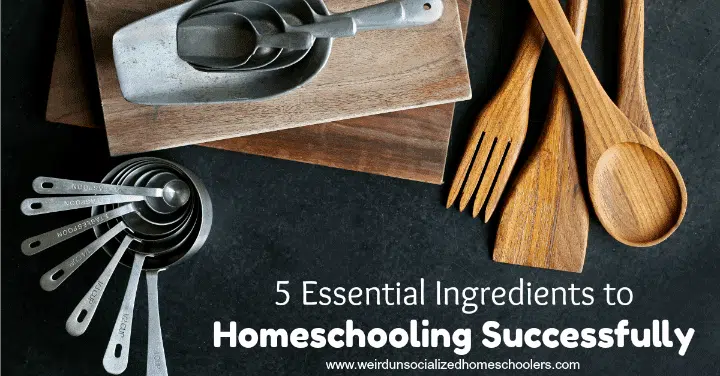5 Essential Ingredients to Homeschooling Successfully
Lots of people think that homeschooling requires lots of stuff – physical supplies, personality traits, and levels of education. However, while there are lots of things you don’t need to homeschool, there are only a few things that are essential to homeschooling successfully.
You know, besides kids. Because that’s kind of a given.

1. Commitment
To successfully homeschool your children, you need to be committed to their education. That doesn’t mean that you have to be a slave to a particular curriculum or to your lesson plans. It doesn’t mean that your home has to look like a public school classroom or that you have to do school from 8:00-3:00 every day.
What it does mean is that you need to be willing to put in the time and effort required to help your children reach their personal best. It may will mean learning alongside them. It might mean giving up the curriculum you love for the one that your kid needs.
You may have to roll up your sleeves and slough through algebra again. (The good news is, you may discover that it makes more sense the second time through.)
You might have to ask for help. Help might come from a friend who tutors math, a co-op that offers a class you don’t feel equipped to teach, or a specialist who can help you with a problem you can’t solve on your own.
2. Self-discipline
Homeschooling also requires some degree of self-discipline. When we started, I was really worried about my follow-through. I tend to plan big but fall short carrying out those big plans.
We’ve done okay – despite the fact that I don’t always follow through on my big plans. (One of the benefits of planning big, by the way, is that you still have plenty of room for success if you fall a bit short. As long as you don’t beat yourself up too much for not doing it all.)
The thing about homeschooling is that there are plenty of days where, just like the kids, you’d rather be doing something else. You’ve got to have the self-discipline to bash on, regardless.
That doesn’t mean that when it’s sunny and 70 degrees in the middle of February, you sit in the house slaving over equations. When you get a rare beautiful sunny day in the middle of February, it’s okay to knock off school for the day and head for the park.
Self-discipline doesn’t mean that you don’t sometimes decide it’s better for everyone’s mental health to put academics aside in favor or a life skills day or a just-because-you-can day.
It just means that the majority of the time when you’d rather read a book or play Words with Friends on your phone, you put the book or the phone aside and do school with your kids. (Though reading days are pretty cool, too.)
It means that, though you’re not a slave to your plans, unless you’re slowing down because your child needs more time on a concept, most of the time you get through most of what you’d intended.
3. Willingness to let go of a classroom mindset
Most homeschooling parents that I know are first-generation homeschoolers. Our educational model is our public school experience. It can be hard to let go of that. I even know some second-generation homeschoolers who have fallen back on their perception of that model because it’s what feels educational.
If you’re a school-at-home family and that’s working for you, great. But I’m not even talking about just how you homeschool, but your idea of what education looks like.
Part of homeschooling successfully is changing our mindset of education. It means letting go of concepts like ahead and behind. It’s being willing to embrace a tailored education and let our kids learn at their own pace.
It means broadening our view of what is educational. (Hint: It’s more than just textbooks.) It’s looking for the educational opportunities that are all around us and creating a learning-rich environment.
It means being willing to dive into those rabbit trails, turn LEGOs or Minecraft into learning tools, or let your kid spend the morning tinkering with that new computer program.

4. Support system
Homeschooling can be hard. You don’t need the whole world in your corner. (Thank goodness because you’re not going to get it.) You don’t even need to have your extended family on board. But you do need one or two people you can count on to talk you down on the hard days.
Hopefully, in most cases, we have our spouse’s support. It’s also nice to have another close friend or two who homeschool and can cheer you on. However, support can come from unlikely sources. Take it where you can get it.
When we first began homeschooling, one of my biggest cheerleaders was a friend whose kids attended private school. She had no desire to homeschool her kids, but she fully supported my desire to homeschool mine. Not only did she support me, but she also let me know that she thought I was a great homeschool mom.
Online friends can also be a great source of support. I may be biased, but our Weird Unsocialized Homeschoolers Facebook Community is one of the most encouraging, supportive, non-judgmental groups I’ve ever been a part of.
5. Resiliency
I used to have a pretty thin skin. I got my feelings hurt fairly easily. I’m not sure if it’s homeschooling or blogging that toughened me up. Probably a little of both.
To homeschool successfully, you’ve got to have some degree of resiliency or a willingness to develop it. If you don’t, those strangers at the grocery store (or the trolls on the internet) are going to have you putting your kids in school before you know it.
And, if the strangers aren’t enough, the homeschooling community itself sometimes forgets it’s a community. We can be pretty harsh with each other.
And, the kids. They can make you cry, y’all.
Then there’s us. That voice in your head can be harsh. Worries will keep you up at night.
It’s important to know why you homeschool and what you expect the end result to be. Sometimes, it’s the why that keeps you going when you start to question whether or not you should just throw in the towel.
There are lots of wants in the homeschooling world, but only a few actual needs. Your love for your kids and your desire to create the best educational experience possible for them makes the list of real essentials pretty small.
You’ve got this
What are some things you thought were essential for homeschool success that you discovered really weren’t that important? How has homeschooling changed your view of education?





